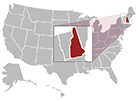
In that case, you should check out the article below.
You will get to learn more about the licensing process and how you can start a successful career.
Page Navigation
Phlebotomist Employment and Job Duties in New Hampshire
In this state, as the demand for phlebotomists grows, you will not have any difficulty in finding your first job.
There are numerous facilities that are hiring, such as:
- Hospital and clinics
- Blood banks
- Community Health Centers
- Doctor’s Offices
- Other Health Care Facilities
- Labs
- Nursing homes
A phlebotomist’s main task is to draw blood and send it for analysis.
Some additional daily tasks you will have to finish are:
- Venipunctures
- Choosing the correct vials
- Correctly labeling samples
- Organizing and sending off samples to the lab for testing
- Communicating with patients
- Following strict procedures
This job may require you to stand on your feet for many hours and have a long schedule.
Depending on the facility that hires you, you might also have to work on the weekends.
Requirements to Become a Phlebotomist in New Hampshire
While this state doesn’t require a license, certified phlebotomists find a job much easier.
Phlebotomists in New Hampshire are overseen by the New Hampshire Department of Health and Social Services.
So, you should consider attending a training program offered through a school in your area.
This will help you get the certification you need in order to start working.
To become a successful phlebotomist, you need:
- A high school diploma or GED
- Specialized training
- Strong communication skills
- Good listening skills
- Pay attention to details
Some of these skills are required to explain procedures to patients or to try to calm them down when they show signs of stress.
To minimize the risk of accidents, you should ask the patient about any particular health issue.
Phlebotomist Training in New Hampshire
When choosing a training program, there are a few aspects to pay attention to.
The training program of your choice must be approved by the National Accrediting Agency for Clinical Laboratory.
Many training programs end in a diploma and last for about 3 weeks.
Other programs last for half a year and finish in a degree.
When the program finishes, you will also need to pass a licensing test before your license will be issued.
Remember that you will need a clean record to obtain certification in New Hampshire
You can read more about the below schools when searching for a training program.
2 Phlebotomy Schools in New Hampshire
| School Name | Address |
|---|---|
| Manchester Community College | 60 Bidwell St, Manchester, CT 06040 |
| River Valley Community College | 1 College Drive, Claremont, NH 03743 |
Each of the available schools has its own admission rules, tuition, and classes.
The phlebotomy training will be split into two sections:
- Theory classes
- Practice classes
You will also join several classes related to:
- Medical terms
- Anatomy
- Physiology
- Safety procedures
- The 40 most common lab tests
The tuition can also cover the costs for:
- Textbooks
- Lab supplies
- Exam fees
- Uniform for the graduation
Many students are using the school’s job placement options, so keep this in mind if you want to get hired faster.
Phlebotomist Certification in New Hampshire
Most clinics, hospitals, and other facilities in New Hampshire need phlebotomists who already have certification.
Some of the facilities that provide a phlebotomist license are:
- American Medical Technologists
- American Society for Clinical Pathology
- American Society of Phlebotomy Technicians
- National Phlebotomy Association
The National Phlebotomy Association provides many types of classes that will help you improve your skills.
The exam is usually split into two different sections:
- Practical
- Written or oral
Your license will need to be renewed after a period varying between 1 to 10 years.
The period varies according to the entity that first issued the certification.
In this state, you need to join additional education classes before you apply for renewal.
Phlebotomist Salary Information in New Hampshire
In New Hampshire, you can easily find an entry-level position, as the industry keeps increasing.
The median salary for a phlebotomist in New Hampshire is $35,822 per year.
Experience, locations, and other certifications will influence how much you’ll earn.
The following table below shows the average salaries for phlebotomists in New Hampshire’s biggest areas.
Annual Salary Range:Average Salary of Phlebotomists in New Hampshire
| City Name | Salary |
|---|---|
| Manchester | $36,210 |
| Nashua | $38,257 |
| Concord | $36,422 |
| Derry | $37,192 |
| Dover | $36,140 |
| Rochester | $35,991 |
| Salem | $37,693 |
| Merrimack | $38,257 |
| Londonderry | $38,257 |
| Hudson | $38,257 |
Regional Salary
| Region | Employed | Avg. Annual Salary | Avg. Hourly Pay | Top 10% Annual Salary | Bottom 10% Annual Salary |
|---|---|---|---|---|---|
| Manchester-Nashua, NH | 220 | $47,180 | $22.68 | $56,620 | $39,120 |
* Employment conditions in your area may vary.
Additional Information for Phlebotomists in New Hampshire
Becoming a phlebotomist offers full-time employment and a variety of other benefits and reasons.
Some of these are:
- Not too many employees in the medical facility
- A higher salary
- Better job opportunities
 Phlebotomy Schools by City
Phlebotomy Schools by City
This page is also available in Spanish.





